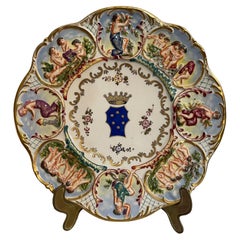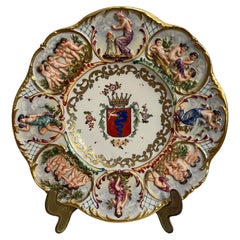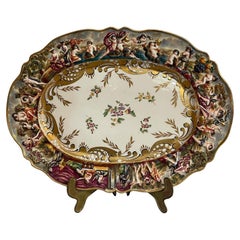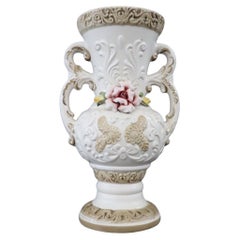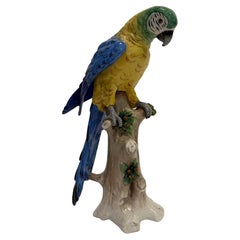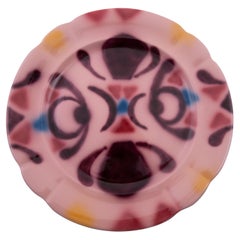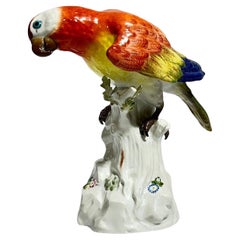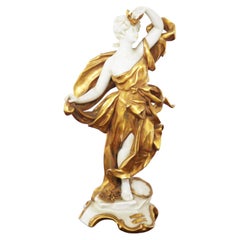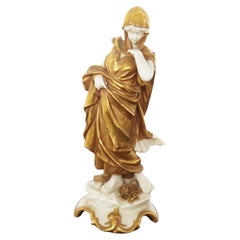Capodimonte Ceramics
If success is measured by lasting name recognition, Capodimonte porcelain would seem to be in the same league as such makers as Meissen, Sèvres and Wedgwood. Early examples of the Italian manufacturer’s celebrated porcelain vases, figurines and sculptures can be hard to come by, but the best later pieces possess the same over-the-top charm.
The Real Fabbrica (“royal factory”) di Capodimonte hasn’t actually produced porcelain since the early 19th century, when Charles’s son Ferdinand sold it. Although secondary manufacturers have built upon the aesthetic and kept the name alive, some connoisseurs of the royal product feel these pieces should be labeled “in the style of” Capodimonte.
The timeline of royal Capodimonte porcelain is decidedly brief. From beginning to end, its manufacture lasted approximately 75 years. King Charles VII of Naples, who founded the manufactory in 1743, began experimenting with porcelain around 1738, the year he married Maria Amalia of Saxony. No coincidence there. His new bride was the granddaughter of Augustus the Strong, Elector of Saxony and founder of Meissen, the first European hard-paste porcelain manufactory. Her dowry included 17 Meissen table services.
Struck by porcelain fever, Charles built a dedicated facility on top of a hill (capo di monte) overlooking Naples. He financed expeditions to search for the right clay. He hired chemists and artisans to experiment. His earliest successes were small white snuffboxes and vases, although efforts soon progressed to full sets of tableware, decorative objects and stylized figurines of peasants and theatrical personalities.
In 1759, Charles succeeded to the throne of Spain. He moved the manufactory with him — including 40 workers and 4 tons of clay — and continued operations in Madrid. Twelve years later, his son Ferdinand IV, who inherited the throne of Naples, built a new factory there that became known for distinctly rococo designs.
The Napoleonic wars interrupted production, and around 1807, oversight of the royal factories was transferred to a franchisee named Giovanni Poulard-Prad.
Beginning in the mid-18th century, porcelain made by Charles’s factory was stamped with a fleur-de-lis, usually in underglaze blue. Pieces from Ferdinand’s were stamped with a Neapolitan N topped by a crown. When secondary manufacturers began production, they retained this mark, in multiple variations. The value of these later 19th- and 20th-century pieces is determined by the quality, not the Capodimonte porcelain marks.
Find antique and vintage Capodimonte porcelain on 1stDibs.
Late 19th Century Italian Napoleon III Antique Capodimonte Ceramics
Ceramic
Late 19th Century Italian Napoleon III Antique Capodimonte Ceramics
Ceramic
Late 19th Century Italian Napoleon III Antique Capodimonte Ceramics
Ceramic
1990s Italian Capodimonte Ceramics
Porcelain
Mid-19th Century Italian Antique Capodimonte Ceramics
Porcelain
1980s Italian Mid-Century Modern Vintage Capodimonte Ceramics
Porcelain
Late 19th Century Italian Antique Capodimonte Ceramics
Ormolu
Late 19th Century Italian Renaissance Revival Antique Capodimonte Ceramics
Maiolica
Mid-20th Century Baroque Capodimonte Ceramics
Porcelain
Early 20th Century Russian Capodimonte Ceramics
Ceramic
Late 19th Century German Antique Capodimonte Ceramics
Porcelain
Late 19th Century French Art Deco Antique Capodimonte Ceramics
Ceramic, Porcelain
Late 20th Century Chinese Modern Capodimonte Ceramics
Paint, Porcelain
21st Century and Contemporary Italian Renaissance Revival Capodimonte Ceramics
Ceramic, Majolica, Clay
Late 19th Century German Antique Capodimonte Ceramics
Porcelain
Mid-20th Century Italian Mid-Century Modern Capodimonte Ceramics
Ceramic
19th Century English Antique Capodimonte Ceramics
Porcelain
Early 19th Century British Antique Capodimonte Ceramics
Porcelain
Early 19th Century English Regency Antique Capodimonte Ceramics
Porcelain
1950s Italian Rococo Revival Vintage Capodimonte Ceramics
Porcelain
Early 20th Century Uzbek Capodimonte Ceramics
Ceramic
19th Century Italian Mid-Century Modern Antique Capodimonte Ceramics
Gold
19th Century Italian Mid-Century Modern Antique Capodimonte Ceramics
Gold
19th Century Italian Mid-Century Modern Antique Capodimonte Ceramics
Gold
19th Century Italian Mid-Century Modern Antique Capodimonte Ceramics
Gold
19th Century Italian Mid-Century Modern Antique Capodimonte Ceramics
Gold
19th Century Italian Mid-Century Modern Antique Capodimonte Ceramics
Gold
20th Century Italian Hollywood Regency Capodimonte Ceramics
Ceramic, Paint
1970s Italian Mid-Century Modern Vintage Capodimonte Ceramics
Ceramic
Late 19th Century Italian Antique Capodimonte Ceramics
Porcelain
Mid-20th Century Italian Mid-Century Modern Capodimonte Ceramics
Porcelain
1940s French Vintage Capodimonte Ceramics
Ceramic
1980s Italian Mid-Century Modern Vintage Capodimonte Ceramics
Porcelain
Capodimonte ceramics for sale on 1stDibs.
Creators Similar to Capodimonte
- What is Capodimonte's style?1 Answer1stDibs ExpertFebruary 27, 2024Capodimonte's style is regal and opulent, though it has varied over the years. Early pieces from the celebrated Italian porcelain manufacturer often reflect Rococo design sensibilities, with organic motifs rendered in soft colors. As trends changed, so did the look of Capodimonte porcelain, which skewed Victorian, Edwardian and Art Deco over the years that followed. Capodiomonte has also looked beyond its native Italy for inspiration, producing porcelain ware that reflects Japanese and ancient Roman decorative techniques. Shop a wide range of Capdodimonte porcelain on 1stDibs.
- Is Capodimonte worth money?1 Answer1stDibs ExpertFebruary 1, 2024Yes, Capodimonte pieces may be worth money. Early examples of the Italian manufacturer's celebrated porcelain vases, figurines and sculptures can be hard to come by, but the best later pieces possess the same over-the-top charm and are sought by collectors. The value of a particular item depends on its style, age and condition, as well as supply and demand in the marketplace. To get a better estimate of the value of your piece, consult a certified appraiser or knowledgeable dealer. Explore a wide range of Capodimonte decorative objects on 1stDibs.
- 1stDibs ExpertMarch 13, 2024To identify rare Capodimonte marks, use trusted online resources as a guide. Generally, the oldest pieces produced by the Italian maker during the mid-18th century are the rarest. During this period, Capodimonte typically used only its original blue fleur-de-lis logo as a mark. On reputable websites, you can find images of this mark and others used by the porcelain manufacturer over the years. If you need assistance identifying a particular piece, enlist the help of a certified appraiser or knowledgeable antiques dealer. Explore a range of Capodimonte porcelain ware on 1stDibs.
- 1stDibs ExpertApril 22, 2024What the Capodimonte mark looks like has changed over the years. From 1743 through 1771, variations of the fleur-de-lis were the most common markings. From 1830 to 1967, the Italian maker generally used a letter N or G positioned beneath a crown. From 1967 onward, pieces generally displayed an impressed IPA stamp and a back stamp with a crowned letter N, the IPA lettering and the brand name. You can consult trusted online resources to see images of Capodimonte stamps from various eras. Additionally, you may wish to work with an antiques dealer to verify the age and authenticity of your porcelain. Find a collection of Capodimonte pieces on 1stDibs.
